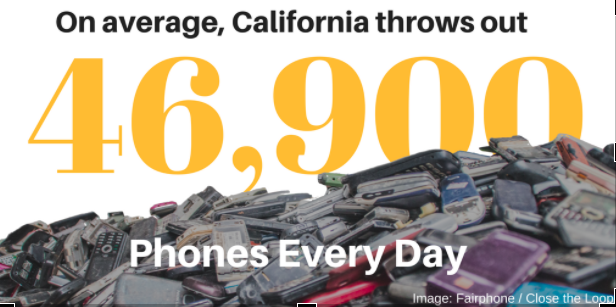Emily Rusch
Vice President and Senior Director of State Offices, The Public Interest Network
Vice President and Senior Director of State Offices, The Public Interest Network
Sacramento, CA — A new survey released today by CALPIRG,“Recharge Repair,” found a surge in consumer demand for phone repair following the revelation Apple was slowing phones with older batteries. “Recharge Repair” identifies the barriers to battery replacement and phone repair that added to long repair delays for consumers. The findings support the need for Right to Repair reforms to grant consumers and third parties access to the parts and tools to repair cell phones and other electronics.
Among the findings were:
We surveyed 164 independent repair businesses nationally who reported a 37% increase in weekly battery replacement service requests since Dec. 20
Self-repair interest surged as well – traffic from California residents to iPhone battery repair instructions went up 139%. 28,923 people from California viewed instructions in between Dec. 20 and Jan. 22
eWaste is a growing concern. California throws out an estimated 46,900 cell phones per day, our share of the 141 million phones tossed each year.
“We should be free to fix our stuff,” said CalPIRG Director Emily Rusch. “We should be working to reduce needless waste – repairing things that still have life — but companies use their power to make things harder to repair. This survey shows that people are clearly looking for more options to repair their phones.”
18 states, but not yet California, have introduced “Right to Repair” or “Fair Repair” laws which guarantee access to the parts and tools needed for repair.
In December, it was discovered that Apple was intentionally slowing down phones with older batteries. They defended this tactic by saying it was intended to reduce performance issues, but had many people wondering if Apple was covertly pushing people to upgrade to a new phone. Regardless of intent, these issues are resolved by replacing the battery – a battery which Apple doesn’t make available to customer or third-party repair businesses.
“These companies go to extraordinary lengths to keep people from repairing their devices. They glue parts to the casing so they can’t be removed, they refuse to sell replacement parts, they digitally lock devices to prevent third party repair,” said Repair.org Executive Director Gay Gordon-Byrne. “Apple is telling some people they can’t fix their batteries until April. Certainly, there are people with easily fixable phones who will get new ones instead of waiting. Why won’t they just sell their original batteries to other repair businesses? This problem would be over in a few days.”
“Californians throw out some 46,900 phones every day,” said Dan Jacobson, State Director for Environment California. “We could be throwing out a lot less if companies let people fix their phones. Electronics like phones have very toxic components, and we could easily reduce the number going into landfills.”
As part of the survey, Robert Slater of Advanced Cellular Repair in California, provided this story, “I restored an iPhone where the customer was getting a searching notification with no phone signal. Verizon told them the device was faulty and they needed a new one. We restored the device, saved the customers data and they were extremely happy.”
CALPIRG and Environment California support Right to Repair reforms because they reduce waste by limiting companies abilities to push customers to toss products that still have life.
“Fixing something instead of throwing it away to buy something new is better for the environment. Repair should be the easier, more affordable choice and it can be. People are resourceful, they can find ways to fix things, to keep them from going to waste, sitting in a landfill somewhere,” said Rusch. “But the first thing we need to repair are our laws.”
